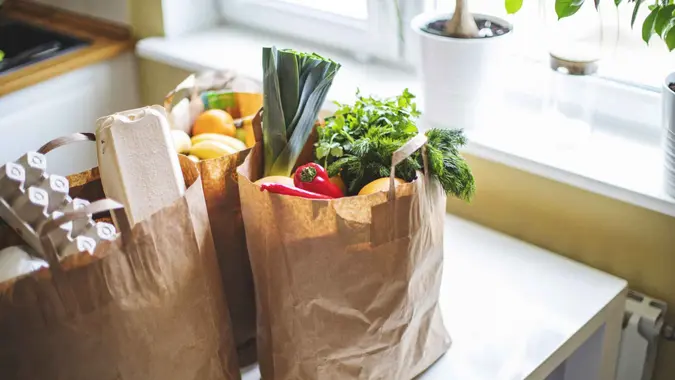5 Ways You Can Stop Overspending on Food

Commitment to Our Readers
GOBankingRates' editorial team is committed to bringing you unbiased reviews and information. We use data-driven methodologies to evaluate financial products and services - our reviews and ratings are not influenced by advertisers. You can read more about our editorial guidelines and our products and services review methodology.

20 Years
Helping You Live Richer

Reviewed
by Experts

Trusted by
Millions of Readers
Inflation is up these days, and the cost of groceries has not been immune to its effects. While inflation has come down from its 9.1% peak in June 2022, it’s still higher than normal and groceries are still more expensive.
A recent CNBC survey reported that young Americans are feeling the pinch from inflation, with 54% of them saying that food inflation is hitting them the hardest.
If you’re feeling the financial squeeze yourself, part of the issue is that you might be overspending on food. Here are some tips to help you stop overspending on groceries and save more money.
5 Ways To Reduce Spending on Groceries
Here are five ways to stop overspending on food at the grocery store, according to Citi Life & Money:
- Pay for groceries with a cash-back credit card: Instead of paying with cash or your debit card, consider using a cash-back credit card for grocery shopping. This way, you’ll automatically earn a percentage back on each grocery purchase. Just be sure to pay your entire statement balance every month to avoid accrued interest.
- Check your pantry before going grocery shopping: Sometimes, you might already have the grocery item you need in your pantry. Be sure to thoroughly check your pantry before you go grocery shopping to avoid spending money on items you already have.
- Store food in portions: Buying food in bulk at a wholesale store like Costco can save you money on groceries. However, buying in bulk also means you’ll need to portion out the food as needed. Don’t fall into the trap of buying 10 pounds of raw chicken, only eating two pounds, and then having the rest go bad in the fridge after a week. Storing or freezing your food in portions as needed will not only save you money but will also prevent you from unnecessarily throwing away food.
- Buy only store-brand products: Savings on store-branded products can be as much as 70% in some cases. Consider switching to store-branded products to save money. The extra funds will give you more financial breathing room and free up cash for other necessities like paying down debt or building your emergency fund.
 Written by
Written by  Edited by
Edited by 

























